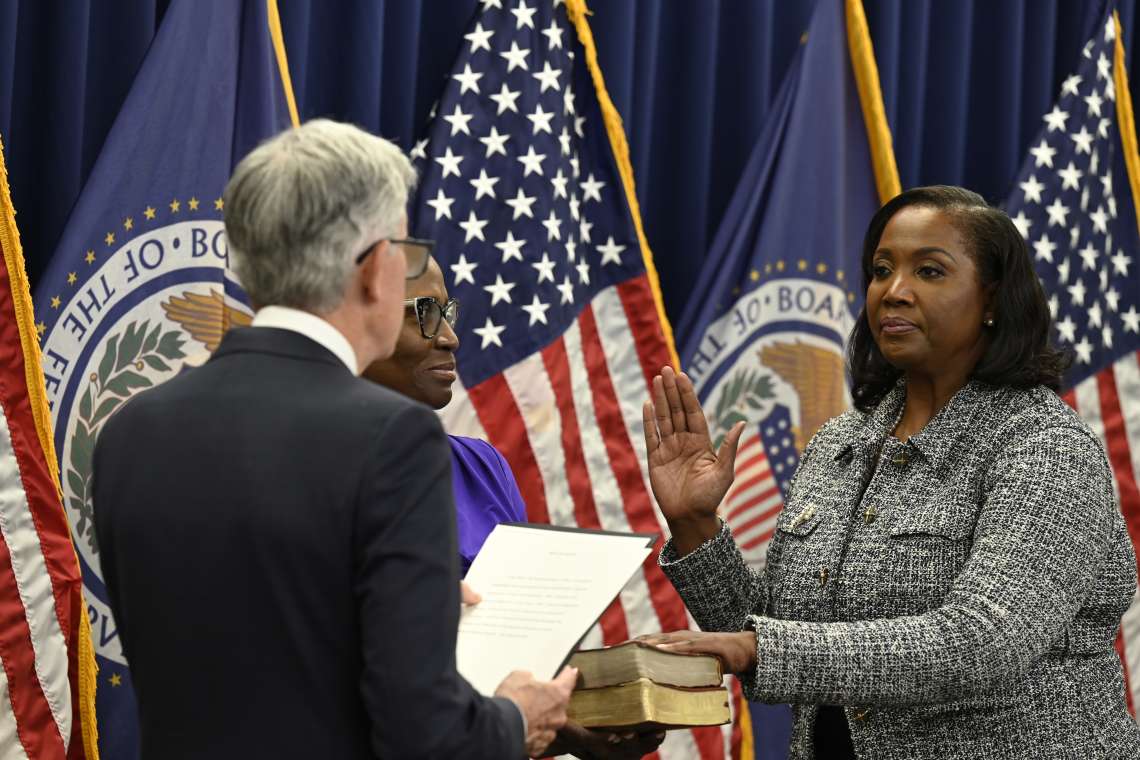US president spent months waging campaign against Fed’s leaders, which has raised questions over its independence…reports Asian Lite News
The United States Federal Reserve governor Lisa Cook has launched a lawsuit against Donald Trump over what she described as his “unprecedented and illegal attempt” to remove her from office, setting the stage for a constitutional clash over the independence of America’s central bank.
Cook filed her complaint in a federal court in Washington on Thursday, challenging the former president’s abrupt declaration that she had been dismissed from the Fed’s Board of Governors. A judge scheduled an initial hearing for Friday morning, though legal experts believe the dispute may ultimately reach the US Supreme Court given its far-reaching implications.
The row erupted earlier in the week when Trump announced, via a letter and subsequent post on his Truth Social platform, that Cook was “removed effective immediately”. His decision was based on an allegation — unverified and relayed by one of his political allies — that Cook had misrepresented a mortgage application for a second home.
Cook, however, has stood firm, insisting the president has “no authority” to fire a sitting Fed governor. “I will continue to carry out my duties to help the American economy,” she declared after news of the attempted dismissal broke.
Cook, who joined the Federal Reserve in 2022 following her nomination by Joe Biden, sits on the Fed’s Federal Open Market Committee (FOMC), the body that determines US interest rates. Members of the board are appointed for lengthy terms to safeguard independence from political pressure; Cook’s term runs until 2038.
Her lawsuit argues that Trump’s move represents “the first of its kind in the board’s history” and directly undermines statutory protections enshrined in the 1913 Federal Reserve Act. That law requires that a governor may only be removed “for cause”, a threshold which Cook’s legal team insists has not been remotely met.
Court filings note that the allegations against her amount to little more than “an unsubstantiated claim about private mortgage applications submitted prior to her Senate confirmation” and therefore fail to constitute “cause” as defined by law. “President Trump’s letter purporting to fire Governor Cook did not cite appropriate cause for removing her from the board of governors,” the complaint states.
Her lawyers also contend that the dismissal attempt violates Cook’s constitutional right to due process. Rather than receiving formal notification, she only learned of her supposed removal through Trump’s social media post.
A White House spokesperson, Kush Desai, defended the president’s actions, arguing that the decision was legally sound and in the public interest. “The president determined there was cause to remove a governor who was credibly accused of lying in financial documents from a highly sensitive position overseeing financial institutions,” Desai said. “The removal of a governor for cause improves the Federal Reserve Board’s accountability and credibility for both the markets and the American people.”
But Cook’s lawsuit maintains that the charges are “pretextual” and form part of a wider effort by Trump to tighten his grip on monetary policy. The filings allege that by removing Cook, Trump seeks to open a vacancy he could fill with a loyalist, thereby advancing his long-stated ambition to influence the Fed’s stance on interest rates.
“Allowing the president to remove members of the board over policy disagreements would render illusory the board’s independence,” the lawsuit argues. It further notes that since Trump’s announcement, economists and academics “from across the political spectrum” have warned of grave consequences for the century-old principle of central bank autonomy.
For months, Trump has railed against the Fed and its chair, Jerome Powell, over their refusal to cut interest rates despite his calls to do so. Policymakers have stressed the need to assess the economic impact of his administration’s tariffs and deportation policies before altering rates. In a statement earlier this week, Trump suggested he expected to “have a majority” on the seven-member board “very shortly”, adding: “We have to get the rates down a little bit.”
Cook’s ousting would not only strengthen Trump’s influence over the Fed but could set a precedent for presidents to dismiss central bankers on political grounds. Such a development, analysts warn, could destabilise financial markets and shake investor confidence in America’s institutional safeguards.
This is not the first time Trump has used allegations of mortgage fraud to target opponents. His administration has previously pursued cases against Letitia James, the attorney general of New York, and Adam Schiff, the California senator, both of whom denied the charges.
While Cook is not a politician, her role as a senior policymaker has placed her in Trump’s crosshairs. She has consistently resisted his demands for immediate rate cuts. Her appointment in 2022 made history: she became the first Black woman to serve on the Fed’s board. A distinguished academic, she has taught at Harvard and Stanford, and served on Barack Obama’s Council of Economic Advisers.
The outcome of her case will be closely watched not only in Washington but across global markets. At its heart lies a profound constitutional question: whether an American president can dismiss a Federal Reserve governor at will, or whether the legal protections designed to shield monetary policy from partisan interference will hold firm.














